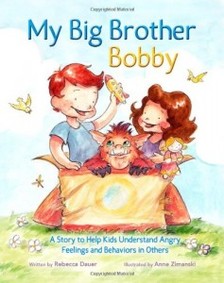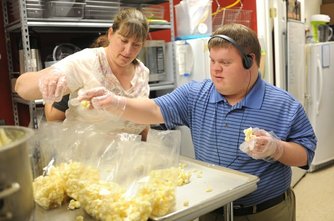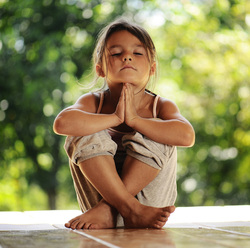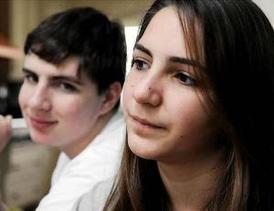 Being angry, seeing red, meltdowns, and freaking out are just a few words we have to describe what happens when a person loses control of themselves. My Big Brother Bobby: Understand Angry Feelings and Behaviors of Others by Rebecca Dauer helps siblings, classmates, friends and other family members to understand children who struggle with emotional and behavioral problems. For some of our children their lives or their environment become overwhelming. They just can’t deal with all the sensory bombardments and may act out, withdraw, become emotional, run, etc. My Big Brother Bobby is a fun, imaginative story that educates children on the importance of understanding and coping with anger in others in a warm and easy to understand way. It isn’t your typical children’s book. It is more of a communication bridge between parents, social workers, OTs, psychologists and children who are dealing with emotional issues, specifically those living with siblings with angry outbursts. Rebecca’s blog is a wealth of information about siblings of children with special needs. We thank Rebecca Dauer for her guest post introducing her book and agreeing to take part in our Author Interview Series. Lorna: Congratulations of your book, My Big Brother Bobby: Understand Angry Feelings and Behaviors of Others. What is the story behind this book? Why did you think a book on this topic was needed? <<Rebecca Dauer: The story behind the book is loosely based on stories from friends and family as well as my personal experiences. When I was younger, there was very little materials or outlets for siblings and I felt the need to change it. After doing research for the book, I found an immense amount of support from the sibling community. Everyone can relate to this book, whether it is a parent, sibling, cousin or friend who has a monster in their belly, it is hard on everyone and especially for young children. I wanted to bring to light the real struggles and emotions that children have and to bridge the communication gap for parents and health professionals.>> Lorna: You and the illustrator, Annie Zimanski, make a very good team. Annie’s illustrations bring your story to life! Usually how does the author of a picture book work with the illustrator? It seems to me there is a lot of communication that most go on to finish with a beautiful book like My Big Brother Bobby. <<Rebecca Dauer: Great question! I found Annie on elance.com after searching through several children’s book illustrators. I loved her work and she related well to the book. The first step in the process is to understand the story and then, creating the characters in the right medium. For example, they could look digital, acrylic or have a soft pastel look. Each change of color, character and background give a different look and feel to the book. Once the characters are built, then you break down each illustration by page with a sketch. Once each page is sketched and tweaks have been made, full color and background detail is added. Then there are a few final edits and that’s it! I enjoyed working with Annie and would recommend her to anyone looking for a great illustrator.>> Lorna: Is this your first book? You chose to self-publish it. What advice do you have for other authors who are thinking of self-publishing their book? <<Rebecca Dauer: Yes this is my first book. Self-publishing is a bit more streamlined and inexpensive because you don’t need an agent or wait until you are signed. If you have a PDF version of your book, you simple buy an ISBN and upload online. I used CreateSpace through amazon where books are purchased on demand. I was also able to add the book to the app store. I also became a member of the Independent Book Publishing Association (IBPA) for its resources and helpful guides into the publishing world. I recommend using those, becoming a member of IBPA, creating a website and promoting through social media.>> Lorna: In your book you mention a support organization for siblings, Sibling Leandership Network and the Sibling Support Project. Please tell us what they offer siblings. <<Rebecca Dauer: The SLN and the Sibling Support Project are completely dedicated to helping the siblings of children who are physically or mentally disabled. The SLN provides siblings of individuals with disabilities the information, support and tools to advocate for their brother or sister to promote the issues important to them and their entire family. They are also very involved in policy and advocacy. The Sibling Support Project headed by Don Meyer (who wrote a review for my book) is a national effort dedicated to the life-long concerns of brother and sisters of people who have special health, developmental, or mental health concerns. Sibshops are International and give children a community-based peer support program and provide awareness of siblings unique, lifelong, and ever changing concerns through workshops, websites, and written material. It is an amazing community and organization. If you would like more information, please visit below: -To keep reading the article please click: HERE
0 Comments
 Blake Satterfield is proud to open the door and greet guests at Special Kneads and Treats on the Lawrenceville downtown square. He shows guests to a table and to the gourmet cupcakes on display behind the bakery counter. Blake has Down syndrome and wouldn’t be the first person many businesses would put at their front door. But Blake and others with special needs are the reason why Special Kneads and Treats opened four weeks ago. “From his first day here, he has felt included and productive,” said Blake’s mother, Pat Satterfield. “It’s a wonderful thing for our guys to give back to the community and feel accepted and useful. Once they get the hang of things, when they see a need, they get things done and make people feel welcome.” Special Kneads and Treats at 132 E. Crogan St. is a nonprofit bakery that provides job skills training to special needs adults. It was opened by Tempa Kohler and her husband, Michael, when they purchased the former Sweets on the Square. “We prayed for only provisions and a building and God gave us a bakery with ovens, freezers and an established client base,” Tempa Kohler said. “And now we’re building our own client base. It’s awesome and definitely a God thing.” The Kohlers opened the bakery to help their son Bradley, 24, who was diagnosed with Fragile X Syndrome when he was 7 years old. Fragile X Syndrome is a genetic chromosome disorder that causes mild to severe mental impairment. “Kids with special needs can stay in the Gwinnett School system until they are 22 years old and then they age out,” said Kohler. “We’re here to employ special needs adults and give them a place to come and work and hopefully learn a skill set that they can take to another location.” Kohler is operating the bakery with one employee and five special needs adults who often have family members who stay and help with baking duties. The special needs adults have opened the door and greeted guests, washed dishes, cleaned tables, swept the floor and helped with lettering on cupcake wrappers denoting when they were made. They also help in the kitchen when adequate supervision is in place. Adults with special needs are loyal,” Kohler noted. “They’ll be the first to show up and if you show them a job, they will do it and do it well.” To Read the full article click here: http://www.gwinnettdailypost.com/news/2014/mar/01/lawrenceville-bakery-provides-job-skills-training/  Mindfulness is Buddhist practice adapted to mental health purposes. The essence of mindfulness practice is focusing on one thing in the moment–each breath you take, each step as you walk, the sights or sounds around you. Elisha Goldstein, PhD writes about and teaches mindfulness, particularly an approach called Mindfulness-Based Stress Reduction (MBSR), captured in his recently published A Mindfulness-Based Stress Reduction Workbook, co-authored with Bob Stahl. He talked to me via email about what Mindfulness-Based Stress Reduction (MBSR) is and how it helps: Mindfulness-Based Stress Reduction is a formal eight-week program with a daylong intensive that was created by Jon Kabat-Zinn in 1979 and has now been adapted to a workbook format to support people in doing this work. This program is in over 250 hospitals around the country and many more around the world supporting people with stress, anxiety, depression, chronic pain, alleviating stress related to medical conditions and much more. To read more click here: http://www.psychologytoday.com/blog/crisis-knocks/201003/mindfulness-based-stress-reduction-what-it-is-how-it-helps Some disabled children need help to behave well. This can be very annoying for siblings who can get fed up with coping with difficult behavior. Sometimes when your brother or sister behaves badly it may seem funny and it maybe makes you laugh. Sometimes you may tease your brother or sister and this may end up with them getting angry, throwing things or hurting you. The best thing for you and them is to encourage your disabled brother or sister to behave well. SOME THINGS YOU CAN DO ARE
To see the full article click here: http://www.youngsibs.org.uk/info/helping-your-brother-or-sister-to-behave-well/  My kids are only 2, so I'm still not fully in the loop of kid-culture. Frozen largely stayed off my radar during its run in theaters, because I am NOT crazy enough to take these two to a movie in a theater yet, and I didn't even see trailers because we don't have cable and they don't show ads for movies on Hulu very often. I'd see posts in my social media feeds from moms of older kids complaining about watching it for the umpteenth time, or having the songs stuck in their heads, and I even saw a few videos shared that related to the film, like those self-declared good-looking parents lip-synching. (Tip: unless you're Derek Zoolander, never talk about how good-looking you are.) All that said, the other day we bought Frozen and tried to watch it as a family. The girls had had a long, late nap that day, so we were looking for a low-key evening activity. And I'd been kind of curious about a movie I heard was about two sisters -- I have a sister and am raising a pair of sisters and YAY SISTERHOOD, you know? I popped popcorn, and all four of us snuggled on the couch and we pressed play. Elmo? the girls asked. And kept asking. Basically, through the entire movie they wanted to know where the heck Elmo was, and if Elmo wasn't in this movie, why were we watching it at all? We didn't even finish before putting them to bed. To read more: http://www.huffingtonpost.com/sarah-sweatt-orsborn/watching-frozen-with-my-daughters_b_5105525.html  When Gabby Abramowitz was younger, she was cautious about inviting new friends to the house. She wasn't sure how they would react to her younger brother, Ben, who is autistic. And she didn't want a repeat of the Simpsons incident. That was the time she had a friend over for dinner, and Ben sat at the table reciting the entire "Treehouse of Horror" Simpsons Halloween special. Gabby pleaded with him to stop, but he persisted. "My friend was like, 'What's going on?' and then started laughing," she said.At that time, she was in elementary school and lacked the words and understanding to explain her brother's condition. But with the help of her parents and through her own study, Gabby, now 16 and a sophomore at Tenafly High School, has grown to understand the nuances of autism and often speaks out to teach her peers while growing closer to Ben, 14. Through her research, she found that her experiences, and those of others like her, often are overlooked. "I think the effect on siblings is underestimated. We get pushed into the background." Read more: http://www.autismsupportnetwork.com/news/autisms-effect-normal-siblings-09277321#ixzz2v2F3NBHL Here with a short video Spencer Timme made about what it is like to have an older brother with autism. He writes: I hope you enjoy it and see how blessed I am to have Mitchel as my brother. I love him to death and I want everyone to see how awesome our bond is! *note, every case of autism is different some more severe than others, not every autistic person is like my brother. This video speaks on behalf of my personal relationship with my brother. |
AuthorRebecca is an independent publisher working to help siblings of children with emotional challenges. Archives
April 2017
Categories
All
|
My Big Brother Bobby: A Story to Help Kids Understand Angry Feelings and Behaviors in Others
 RSS Feed
RSS Feed
